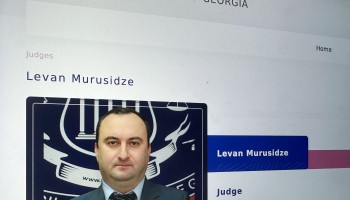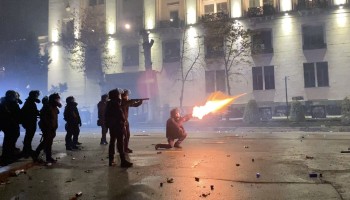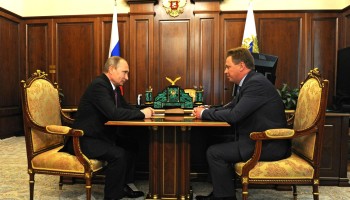Reported by
The U.K. imposed sanctions on Georgia’s prosecutor general and three other senior officials on Thursday, accusing them of “allowing brutal police violence” against anti-government protesters.
According to the U.K. government’s sanctions designation, Prosecutor General Giorgi Gabitashvili failed to hold police accountable for violent crackdowns on demonstrators last spring, according to London’s sanctions designation. Gabitashvili, appointed in July 2024, previously served as deputy prosecutor general.
The protests erupted in May 2024 in response to the Georgian government’s proposed Transparency of Foreign Influence law, which requires NGOs and media outlets receiving foreign funding to register as “agents of foreign influence.” Critics say the legislation mirrors a Russian law used to suppress dissent.
The U.K. also sanctioned Karlo Katsitadze, head of Georgia’s Special Investigatory Service; Mirza Kezevadze, an Interior Ministry official; and Deputy Interior Minister Shalva Bedoidze for their alleged involvement in human rights abuses related to the crackdown.
Anti-government demonstrations have continued since November, fueled by the ruling Georgian Dream party’s decision to suspend EU accession talks until 2028. Security forces have faced widespread accusations of using excessive force against protesters.
In announcing the sanctions, U.K. Foreign Secretary David Lammy condemned the Georgian government’s failure to hold perpetrators accountable.
“The scenes of brutal violence against protesters, journalists and opposition figures in Georgia were truly shocking,” Lammy said, according to the press release. More than 100 days later, he said, authorities have failed to hold those responsible to account, “flying in the face of Georgian Dream’s claim to be delivering a democratic future.”
“Our sanctions show the U.K. will not accept such a blatant lack of accountability by those in charge, and will continue to consider all options available to us until Georgia reverses its current trajectory,” he added.
The sanctions include asset freezes and travel bans for all four officials. At least one of them—Karlo Katsitadze—had previously visited the U.K., with Georgian media circulating a photo of him in front of London’s Tower Bridge.
The new designations build on previous U.K. sanctions issued in December against Georgia’s interior minister and other officials for their roles in suppressing protests. Last week, the U.K. also sanctioned two influential Georgian judges for alleged corruption.
In response, Georgian Dream deputy chairperson Levan Machavariani accused the U.K. of funding domestic NGOs. “This is yet another example of how the ‘deep state’ is fighting,” he said.
Amid mounting resistance to the foreign influence law, the Georgian Dream-led parliament earlier this month passed a revised “Foreign Agents” law modeled on U.S. legislation, which now criminalizes non-compliance.






